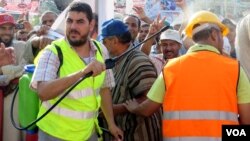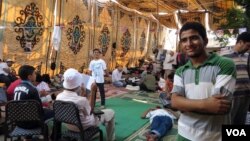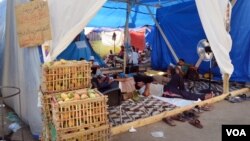CAIRO —
As Egyptians gear up for rallies on Friday, supporters of former president Mohamed Morsi say Army Chief Abdel Fattah el-Sissi's call to the streets is a direct threat to their safety. As they prepare for counter-rallies, thousands of Morsi supporters are hunkering down in what has grown into a self-contained protest village.
It’s early afternoon, but pro-Morsi, pro-Muslim Brotherhood, rallies here in Nasr City are already growing fast. Thousands of people chant in support of the former president, who remains in custody.
But behind the stage, bull horns and men spraying water on the hot crowds to cool them off, is another kind of demonstration.
The people who live in the tent village, built on the streets in a major metropolitan area, appear to number in the thousands.
Volunteer security guards among the protesters cordon off the tents and the staging area, searching anyone who wants to enter.
The people who live in the tent village, built on the streets in a major metropolitan area, appear to number in the thousands.
Volunteer security guards among the protesters cordon off the tents and the staging area, searching anyone who wants to enter.
Small businesses are set up on tarps and folding tables on the streets. You can buy purses, shoes, Morsi T-shirts and locally-made arts and crafts.
Protesters say when they are not marching or chanting, most of their ranks are not doing business but resting and reading the Quran on mats under the tents. It’s at least 35 degrees Celsius and during the Ramadan fast they can’t even drink water before sundown.
Fifteen-year-old Abdulrahman Usama says he has been living in a tent on the street with his parents and five brothers and sisters since June 28, when protesters both for and against Morsi gathered en masse. When Ramadan is over, he says, he won’t go back to school unless the president, the constitution and the parliament are reinstated.
Emad Zaghlul Mustafa used to be a music teacher. Now he fills glass vials with colored sand, creating pictures of landscapes to sell on the streets.
Like many groups of now-splintered activists in Egypt, Mustafa says his group is responsible for the February 2011 ouster of Hosni Mubarak, referred to here with reverence as “The Revolution.” The revolution, he says, was about economic injustice.
He says the current protests are a continuation of what began in 2011 and they will continue indefinitely. Other pro-Morsi protesters, however, say they fear that their makeshift community is in danger in the coming days, after the army chief called on the people to rally this Friday to give him the “mandate to confront possible violence and terrorism."
Key Dates in Egypt
Key Dates in Egypt- February 11, 2011 - President Hosni Mubarak resigns after weeks of massive protests and clashes
- January 21, 2012 - The Muslim Brotherhood's Freedom and Justice Party wins almost half of Egypt's parliamentary seats
- June 24, 2012 - Mohamed Morsi becomes Egypt's first freely elected president
- November 22, 2012 - Morsi grants himself sweeping powers, sparking protests
- July 3, 2013 - The army removes Morsi from power and suspends the constitution
As Usama explains that he wants to grow up to be a sheikh, Ahmad Tahan breaks into the crowd with urgency.
Tahan says when the army chief says he wants to confront violence, he means he wants to attack people who support the Muslim Brotherhood party, which is on the side of reinstating Morsi’s democratically elected government.
Tahan says when the army chief says he wants to confront violence, he means he wants to attack people who support the Muslim Brotherhood party, which is on the side of reinstating Morsi’s democratically elected government.
“We’re here asking for our vote. Where are our votes? Our votes are in the rubbish. Do you believe this? I cannot believe that the army is here today asking for people to start the civil war," he said.
Egyptians have been protesting on the streets consistently since the revolution began, with increasing violence in recent weeks. More than 100 people have been killed in clashes since Morsi was removed on July 3 and locals say the army chief’s call to action can only make things worse.







